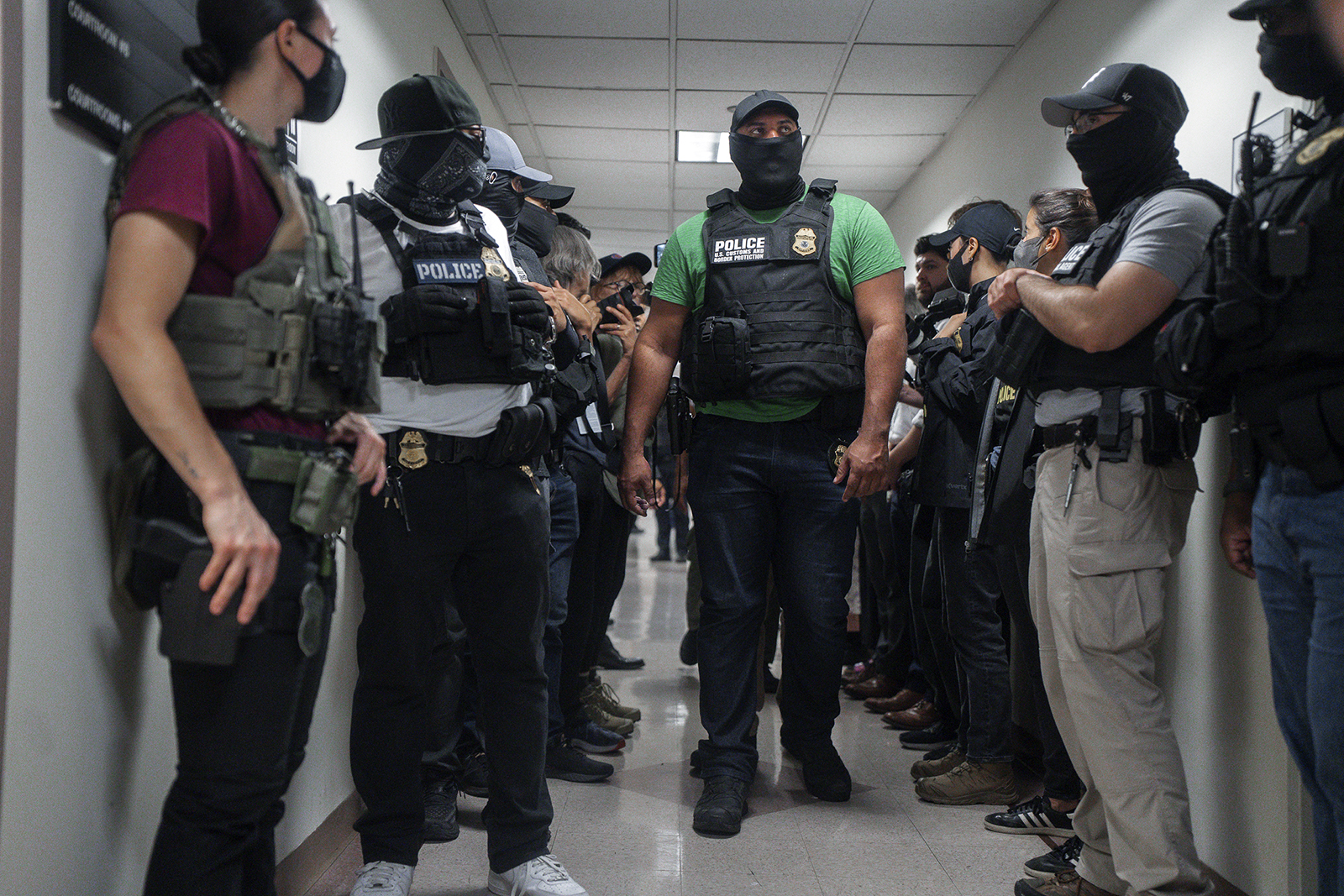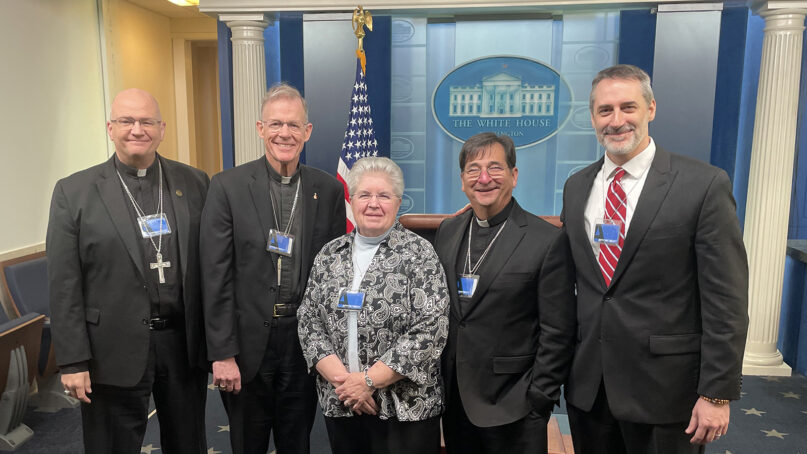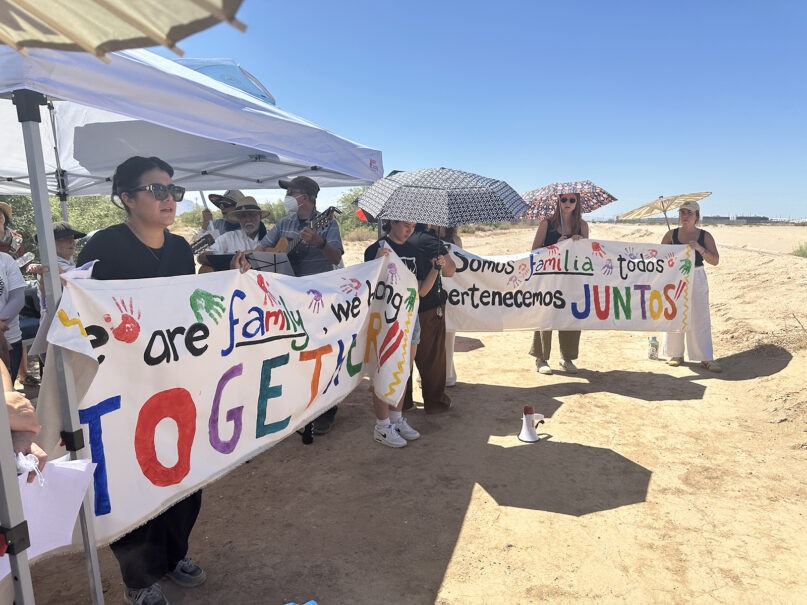
WASHINGTON (RNS) — As the so-called One Big, Beautiful Bill — the Republicans’ mammoth budget proposal designed to fund much of President Donald Trump’s agenda — made its way toward congressional approval last month, U.S. Catholic bishops signed their names to not one but two letters to senators on the same day, both airing misgivings.
The first, sent by the U.S. Conference of Catholic Bishops, found some things to like, particularly the BBB’s attempts to limit abortion, but railed against provisions that will hurt the poor and the climate. The other, signed by a smaller group of bishops and leaders from other religious traditions, blasted its massive increase in funding for immigration enforcement and called on Congress to vote against the legislation.
The USCCB ultimately condemned the final bill passed by the House after its abortion-related provisions were mostly changed or removed. But the existence of dueling letters, church observers say, offered a rare public glimpse of a rift that’s been years in the making. Fueled by debates over the late Pope Francis’ papacy and how to respond to Trump’s immigration policies, the multiple statements broke with the bishops’ tendency to speak uniformly on major policy issues, at least in public.
Natalia Imperatori-Lee, a theology professor at Fordham University, noted that the Catholics who signed the interfaith letter were largely “Francis-aligned.” The group follows the late pope’s attention to the plight of migrants and the poor, she said, and learned under Francis to be unafraid to stir debate.
“You can tell because they are speaking freely, which was the first, and perhaps most important, lesson Francis wanted to impart, from the very first synod he ever called,” Imperatori-Lee said by text.
The divide can be traced to May, when the USCCB issued its initial response to the bill as it was being debated in the House of Representatives, just as the White House sent U.S. Marines to Los Angeles to quell protests against Immigration and Customs Enforcement detentions there. Like the later letter, the USCCB statement offered a mixture of criticism and praise for the bill.

The U.S. Conference of Catholic Bishops meets at the Baltimore Marriott Waterfront hotel in Baltimore, Md., in November 2024. (RNS photo/Aleja Hertzler-McCain)
But Archbishop John Wester of Santa Fe, New Mexico, elevated to archbishop by Francis in 2015, published a sternly worded editorial in America Magazine calling on his fellow bishops to oppose the bill. Wester later told Religion News Service that he also planned to use a USCCB retreat in San Diego in mid-June as an opportunity to encourage other bishops to speak out more forcefully. According to The New York Times, Wester was the primary organizer of the interfaith letter signed by some of those fellow bishops.
“I think people were hoping that the Catholic church leadership would speak strongly against the bill,” Wester said. “So I don’t see myself as being a lone voice.”
Imperatori-Lee said Wester’s public dissent was a welcome shift. “I don’t see it as a bad thing that some bishops feel like the USCCB didn’t go far enough, and so they felt compelled to add their voices to an interfaith community,” she said. “It’s a reflection of the experience of most Catholics, I think, to feel close to people of a variety of faiths, or of no faith, when it comes to matters of justice.”
The USCCB, the established voice of the church, has also been a reliably conservative one on major political debates in recent decades. But dissent has been growing as some Catholic groups have foregrounded issues other than abortion, which has long been considered the USCCB’s primary political issue.
In 2010, the conference infuriated liberals by coming out against the Affordable Care Act, arguing the law would fund abortions and force Catholic institutions to support the use of birth control. But a large group of Catholic sisters defied the bishops and backed the health care bill, and then-President Barack Obama credited the religious sisters with the bill’s passage. (Another congregation, Little Sisters of the Poor, sued the federal government to be exempted from the mandate and won their case at the Supreme Court in 2020.)
After Francis was elected in 2013, emphasizing climate change, immigrants and the plight of the poor, stands associated with the political left in the U.S., the USCCB struggled to embrace the new pope’s game plan. Though at times critical of Trump during his first term, the bishops continued to focus on abortion in their “Faithful Citizenship” voter guides. In 2020, some prominent bishops reacted to the election of Joe Biden, a Catholic, by questioning whether his support for abortion rights disqualified him to receive Communion.
“The USCCB has put itself in a very uncomfortable position by constantly emphasizing a (myopic) view on the legality of abortion as the preeminent ‘life’ issue, at the expense of the myriad ways that ‘life’ and ‘the common good’ are intertwined with a robust social safety net,” Imperatori-Lee said in a text message.
Meanwhile, a small group of liberal bishops began quietly organizing outside of the USCCB. In 2022, Cardinal Blase Cupich of Chicago, one of Francis’ closest U.S. allies, and Cardinal Joseph Tobin of Newark, New Jersey, attended a mostly closed-door gathering in Chicago to discuss how to promote the pope’s ideas. The next year, three bishops, including Wester, and a nun visited the Biden White House to advocate for the environment — a high-level meeting approved by the USCCB but which, according to Wester, came at the group’s “own initiative.”
Trump’s clampdown on immigration since his return to the White House further turned up the pressure on the USCCB. After the administration halted the refugee resettlement program, Vice President JD Vance dismissed the bishops’ objections by suggesting they were only concerned about their “bottom line.” The USCCB later sued to restore the refugee resettlement program.
As time has worn on, leaders of the USCCB have voiced concern about blowback from the administration. In a talk at Loyola University Chicago in April, El Paso Bishop Mark Seitz, who chairs the USCCB’s immigration committee and has been an outspoken critic of Trump’s policies, predicted the administration would threaten the church’s tax-exempt status.

Archbishop Edward Weisenburger of Detroit, Michigan from left, Archbishop John Wester of Santa Fe, New Mexico, Sister Carol Zinn, Bishop Joseph Tyson of Yakima, Washington, and Lonnie Ellis at the White House, Nov. 17, 2023, for a meeting about climate change. (Photo © In Solidarity)
Some Catholic nuns have begun to urge caution as well. Last month, Sister Carol Zinn, a sister of St. Joseph and executive director of Leadership Conference of Women Religious, which represents a large majority of sisters in the U.S., sent an email to the heads of religious women’s congregations. According to people familiar with the email, Zinn suggested that certain kinds of protests could negatively impact communities and schools where sisters work.
Discouraging sisters from talking to the press about the email, the message also emphasized the role of prayer. Some recipients saw the email, which came as sisters were preparing a protest against the Big Beautiful Bill in Washington, as rooted in fear of the Trump administration and concern for sisters living in the U.S. on special visas.
LCWR declined to provide a copy of the email. But Sister Annmarie Sanders of the Sisters, Servants of the Immaculate Heart of Mary and the conference’s communications director, said in a statement that the LCWR believes “the work of justice needs to be integrated in all parts of our lives — including our daily interactions with others and most especially in our lives of prayer.”
She added, “LCWR provides opportunities for members to address justice concerns using our collective voice at the national level and also provides a number of contemplative resources to strengthen our collective impact on the course of the world.”
If the hope was to scale back the protest, the email failed: The number of religious congregations and organizations sponsoring the event only grew as the date of the protest approached. On the day of the event, around 300 Catholic sisters from 40 states stood in the nearly 100-degree heat outside the U.S. Capitol to rally against the budget bill. They listened to speakers such as Sister Patty Chappell, of the Sisters of Notre Dame de Namur, who outlined the bill’s harm to lower-income Americans who depend on food stamp benefits.
“These brothers and sisters live in every major city, where we have built hospitals, we have built schools, we have convents, we have mother houses, we have sponsored ministries, we have formation houses and retirement communities,” she told the crowd.
The leadership of the Sisters of Mercy of the Americas, a group that sponsored the protest, also signed on to the Wester-led interfaith letter.

People attend a Sisters Speak Out event near the Eloy Detention Center, June 24, 2025, in Eloy, Ariz. (Photo courtesy Kino Border Initiative)
While their actions may incur risk, an emerging alliance of Catholic sisters and bishops says their faith compels them to act. At one of many “echo events” in solidarity with the Capitol Hill protest, a group of nuns gathered near the Arizona border outside an immigrant detention center that has been accused of fostering dangerous conditions for people held there. As the sisters gathered, they prayed the rosary’s sorrowful mysteries in a bilingual service.
Sister Eileen McKenzie, a Franciscan Sister of Perpetual Adoration, said they were inspired by a pastoral letter penned by Phoenix Bishop John Dolan — another signer of the Wester-led letter — and his auxiliaries that calls for public prayer, solidarity, peaceful public witness and Eucharistic intercession.
McKenzie said the organizers discussed reports of plainclothes agents in masks and unmarked cars showing up at other faith protests to record license plates and other information. “It’s a risk. There’s no doubt,” she said, particularly for sisters and volunteers who use visas to cross the border.
Nevertheless, some of those at risk showed up anyway. And for McKenzie herself, “those of us who are not targeted because we don’t have brown or Black skin, we know that we hold a place of privilege and a responsibility to stand up.”
